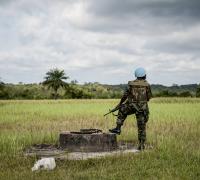Reports from the field: Join DIIS’ partners on fieldwork in Ghana
Ghana has long been the most stable country in West Africa – a region that has been and still is characterized by conflict. During the 1990s and early 2000s, countries like Liberia and Sierra Leone experienced brutal civil wars, and while they are stable today, the Sahel further north constantly makes the international headlines. Through all this, Ghana has not only experienced economic growth and democratic consolidation, but also engaged in peacekeeping and peace support operations across the region, both with the United Nations and the Economic Community of West African States.
What is less known, but a permanent fixture of Ghana, is the variety of security challenges within the country that challenges domestic stability – a hot topic of debate in the Ghanaian media. They include tension and violence in the country’s main mining areas, fights over land, disagreements about who the rightful chief in an area is, and, as these two blogs explore, conflicts in the north between sedentary farmers and nomadic Fulani herders.
The Fulani people are one of the largest ethnic groups in the Sahel and West Africa, widely dispersed across the region. Many of them are pastoralists or herders and constitute the largest nomadic pastoral community in the world. Conflicts with local farmers occur when farmers accuse the Fulani people’s cattle of eating their crops. On top of this, climate changes and industrialisation mean that available land is declining – thereby intensifying tensions. These farmer-herder conflicts, a mainstay in Ghana’s Northern Region, have been addressed by the state with mixed results through Operation Cowleg, for instance, a continuous joint operation of the police and military, and a range of outreach programs.
From global to local conflicts
D-SIP’s aim is to understand how the experiences of military and police personnel on peacekeeping abroad influence their enforcement roles as they return home. On the one hand, the police as well as the military play a key role in domestic security operations. On the other hand, understanding these conflicts at the local level is critical to understand both the dynamics that security personnel are encountering on an everyday basis, and by extension the kinds of conflict that their peacekeeping experiences might be used to deal with.
The two blogs are part of a series from D-SIP members at the University of Ghana, grabbling with doing ethnographic fieldwork on global matters, and the types of questions and discussions that are necessary when doing research.
Read the blogs
"The media is a powerful instrument in Ghanaian land-use conflicts" by Professor Dzodzi Tsikata, Director of the Institute of African Studies, University of Ghana
"The dangers of a single-sided story" by Dr Deborah Atobrah, Senior Research Fellow at the Institute of African Studies, University of Ghana
DIIS Experts


